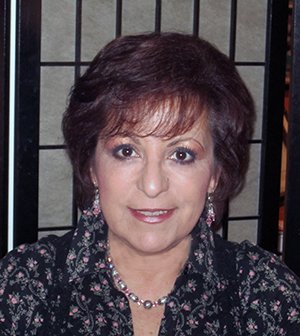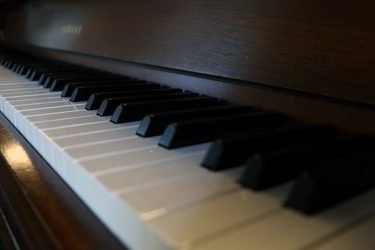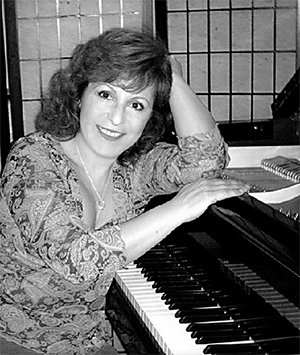
By Lana Sweeten-Shults
GCU News Bureau
Dr. Jelena Vladikovic owns a string of pearls.
She owns the story, too, of how she came to possess them.
It was after a performance in Belgium where, among other works, she performed Franz Liszt's "Vallee d'Obermann."
“I had a lady come to me, with tears in her eyes. Her husband, who was deceased, was a pianist and piano professor. She took a strand of pearls that she had that he bought her when they were first married. She put it around my neck. She said, ‘I want you to have this because of the way you played that piece.' That touched her,” Vladikovic said. "I still have those pearls."
Vladikovic was sitting in her modest office in Coulter, a room dominated by a piano on which countless Grand Canyon University students have sat and soaked up nuggets of artistic brilliance from the mentor they lovingly call "Dr. V." Clearly, she has moved them -- just as she feels moved by a composer's work and hopes her passion, in turn, moves her audience.

She hopes to do just that with her free-admission performance of the work, which will be part of her faculty recital at 7 p.m. Friday in the Recording Studio in Building 57. The recital is an important one for the College of Fine Arts and Production professor of piano because it celebrates 50 years since she gave her first solo recital under artist management.
“It’s me going back down memory lane,” she said.
She doesn’t remember much about that first recital, she said. People have asked her if the performance, called “Celebrating the Past, Inspiring the Future, 1968-2018,” will include works from back then.
“I can’t even recall what I played,” she said of the performance, given when she was just 15 in Belgrade, Serbia. “I was too busy with the dress and the shoes and remembering, ‘Oh, I can put makeup on.’ I recall seeing the little pink faces in the audience and thinking, ‘They paid to see me?’”
Not that Vladikovic was always as brilliant when it came to her piano playing. She admits she was a terrible student.
Nonetheless, she seemed destined to be a musician, having come from a musical family. Her grandfather was a professional violinist, her mother one of the most prominent piano professors in the former Yugoslavia and her uncle the concertmaster of the Luxembourg Symphony.
“I started when I was 7. They stuck me with a violin,” she said.
She and that violin did not get along too well, as she recalled. When their relationship didn’t quite work out, she asked to play the cello, but her family wouldn't give her one.
For her, it would be the piano.
“I was pretty atrocious,” she said. “I used to go roller skating. I would skate to school, but I would stay in the park and not go to my lessons.”
She was adamant, she said, about leaving music school. She was just a little thing when she marched to the office to turn in the form to quit. Of course, the secretary laughed and conveniently "lost" the form. But two years later, something interesting happened. The Yugoslav Association of Music Teachers brought in some distinguished professors from Moscow.
“Those are the people that build generations of performers, and they brought them to conduct seminars for the teachers,” she said.
The piano professor, Evgeny Timakin, was going to take on eight students, and Vladikovic’s mom insisted she be among those who would audition.

“We had a little fight,” she said of her and her mom. “‘Yes you are!’ ‘No I’m not!’ ‘Yes you are!’ And then, I thought, hey, she’s asking me only to audition. She didn’t ask me to play well. So there and then I decided I was going to play as badly as possible.”
Alas, her plan did not work. She was one of the eight Timakin accepted as a student.
That’s when Vladikovic realized that these lessons would be taught in front of 200 teachers and that, with so many eyes on her, she'd better practice.
“I fell in love with the man,” she said of Timakin. “He was this grandfatherly type. He was an incredibly soft and beautiful person, and supportive – and that was it. From then on, I knew I wanted (to continue to play piano), and I knew I wanted to teach at a university.”
Vladikovic practiced enough that she was offered a scholarship to go to the former Soviet Union and continue her studies. She accepted the offer, but “I spent a year there and I said, ‘No, thank you. I don’t love music that much to live this way.' It was really bad.”
But it was a good decision for her. That’s when she started to travel to Rome for lessons with Guido Agosti, taking the 1½-hour flight from Belgrade to Rome at least one weekend a month.
"I would purchase a tourist package, a weekend package in Rome, and so I would go with a tour, arrive Friday afternoon, go out Saturday morning to Guido’s house," she said. "He had anywhere from two to five or six people on Saturdays from all over the world. We had a master class that lasted from 10 in the morning to six in the afternoon. We would start working and his wife would go, ‘Guido, kids need to eat.’ She would say, ‘Stop it.’ It was beautiful.”
She also would take immersive piano workshops in Belgium and Siena, Italy.
When she started teaching at the university level, she was only 22 years old, barely older than the students she was teaching. She was also still just a student herself, studying for her master’s degree at a different university.
When she was in her late 20s, she said, “I was thinking, well, this is kind of stupid. Is there all this is to life? I was playing, touring, teaching university. Basically I’d achieved way too much way too early, and I didn’t see any inspiration or motivation to do anything.”
So Vladikovic decided to do something different. She went to Canada, to which much of her family had emigrated. She decided to start her studies for a doctorate but then had her son.
She got married and said she was going to be a mom for a while. She retired from performing when her son was 2 years old, though she would still give community concerts.
“When my son started school, I was bored stiff,” Vladikovic said.
That’s when she decided to get her journalism degree.
“I always wanted to do journalism,” she said, then moved from there to public relations and graphic design.
Vladikovic moved to Phoenix after her son, who was among the top swimmers in Canada, was recruited by the Phoenix Swim Club. She got a PR job, but “after a year in Phoenix, I just didn’t feel like my life was complete.”

That’s when she returned to teaching and decided to finish the doctorate she never got to finish before her son was born. She taught at Arizona State University for about seven years.
“And then I got called to help out here when the music department was being resurrected under new leadership, and I’m a sucker for startups. That was 6½ years ago and here I am.”
Vladikovic’s recital on Friday will feature pieces of music that connect her to her own professors over the years.
She’ll be performing three sonatas by D. Scarlatti – K. 132 in C major, K. 466 in F minor and K. 125 in G major, which she worked on with Agosti. Also in the repertoire is W.A. Mozart’s Piano Sonata No. 17 in B-flat Major, the first piece she worked on with Timakin. She’ll also perform S. Prokofiev’s Piano Sonata No. 1 Opus 1.
But it’s the Liszt work, “Vallee d'Obermann,” that seems to draw the most out of her.
“I am partial to Liszt because of his spiritual life," she said. "A lot of composers were believers, but there was something about Liszt that I absolutely adore. … A lot of people will characterize him as the showoff pianist and composer, and anyone who plays Liszt will say, ‘Oh, it’s just a bunch of big technique, big chords.' But actually, his works are extremely spiritual. There’s not one you can’t connect to verses from the Bible. This piece has a very emotional connection with me, and I have had a connection with it for many reasons.”
She quotes Romans 8:18 when thinking about the work: “Yet what we suffer now is nothing compared to the glory that He will reveal to us later.”
“It’s a 15-minute work descending from one scale, where it symbolizes, to me, our fall," she said. "The poetry Liszt used to preface this piece talks about existential problems -- who we are, what we are, what are we in this world.”
She said the work’s melody returns again and again in different shapes over 15 minutes.
“It’s a cry at the beginning. It’s painful to play … That same melody, it morphs into a melody of celebration and joy.”
The works for her recital, she said, also represent a walk through the ages, starting with a Baroque work and ending with a piece from the 20th century.
“My goal,” Vladikovic said, “is to serve and offer the music, not just to God, but to audiences, to make them feel what I feel so that we’re in it together.”
You can reach GCU Today senior writer Lana Sweeten-Shults at [email protected] or at 602-639-7901. Follow her on Twitter @LanaSweetenShul.
IF YOU GO
What: “Celebrating the Past, Inspiring the Future,” a faculty recital by Dr. Jelena Vladikovic
Where: GCU Recording Studio Hall, Building 57
When: 7 p.m. Friday
Admission: Free
Information: 602-639-8880 or [email protected]



































































